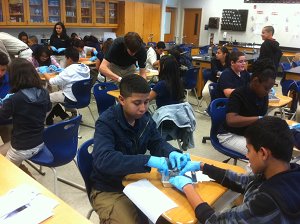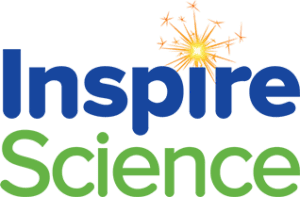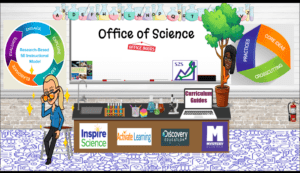Science
|
|
 |
 |
Inspire Science PreK–5 Integrated
An Elementary Science Curriculum:
Inspire Science for grades PreK–5 is designed to spark your elementary students’ interest and empower them to ask more questions, think more critically, and generate innovative ideas. With the proven 5E instructional framework, Inspire Science provides an in-depth, collaborative, evidence based, and a project-based learning experience to place elementary science students on the path to career and college readiness.
Grades K–5 Components
Grades K–5 are built on the 5E instructional framework and integrates life, earth, and physical science. The consumable student edition is organized into four units with one to two modules per unit. Modules contain two to four lessons designed to inspire curiosity, investigation, and innovation.
Science Read Aloud
Introduce new science concepts and incorporate science with literacy using teacher read aloud books for your younger students. These books are perfect for a whole group or small group setting. Each book begins with a fictional story that piques student interest through an engaging story line. Informational text explains the science concepts that were introduced in the paired fictional story. There are two titles per module and the digital versions are great for whole class projection.
Available in Spanish.
Leveled Readers
Build literacy skills and science content knowledge simultaneously with interesting, informational text. There is one leveled reader title for every module. All leveled readers are available in approaching, on-level, beyond-level, ELL, and on-level Spanish. Each reader includes text-dependent questions, vocabulary support, a fictional paired reading, and hands-on activities. The interactive versions of the leveled readers provide students with fun features like audio (including word-by-word highlighting), note-taking tools, and point-of-use vocabulary support.
Investigator Articles
Unleash student curiosity with real-world, Inspire Science Investigator articles. These informational text articles introduce students to real-world science and engineering and are packed with stunning imagery, dynamic graphs, tables, maps, and close reading questions that are sure to capture student interest and engage them in learning. Investigator articles are available in on-level, approaching-level (digital only), and Spanish on-level.
Activate Learning 6–8 Middle School Science Curriculum:
Students investigate questions relevant to their lives by conducting investigations; collecting and analyzing data; developing and using models to explain phenomena, and engaging in argument from evidence, all in a literacy and discourse-rich environment. Lessons are organized into thematic units such as Can I Believe My Eyes? (Physical Science) and What's Going on Inside Me? (Life Science), that support students as they build understanding of core ideas in science as well as understanding and use of scientific practices. Students also pursue their own original questions in units that integrate the fundamentals of Physical Sciences, Life Science, and Earth & Space Science.
As research indicates, and the Framework for K-12 Science Education and NGSS describe, students learn best when they use coherent materials that support them in building understanding over time.
Examples include:
- Sixth-graders learn about species interactions in ecosystems by investigating data from real-world examples of invasive species.
- Seventh-graders explore properties, chemical reactions, and the conservation of mass by making their own soap materials they have investigated across multiple lessons.
- Eighth-graders race, jump, and crawl in the classroom to measure properties of motion and create graphs based on physics equations.
- Eighth-graders use a computer program to investigate a drop in the Galapagos Islands’ finch population.
By referencing real-world science with which students are familiar or have personal experience, science learning has value to diverse students who can apply what they are learning to their everyday lives.
Newark Board of Education Department of Science


 <<Click Here!
<<Click Here!